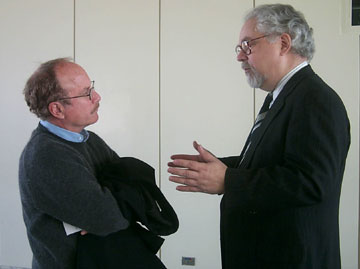
|
|
Professor Richard Bulliet (right), Director of the Middle East Institute, right, chats with the actor Richard Dreyfuss during a break in a conference about television and society in the Middle East, held this week at the School of International and Public Affairs.
|
Columbia University hosted a groundbreaking two-day gathering this week of Arab television news anchors, correspondents, commentators, producers, talk show hosts, and network executives who are the vanguard of an electronic media revolution that has led to more open coverage and discussion in the Middle East.
Spurred by the introduction of news channels beamed by satellite to countries throughout the region, the Middle East is undergoing an explosion of hard-hitting news programming, from American-style talk shows on previously-taboo subjects to live debate on social and political issues to reports from field correspondents to live, blunt interviews with government leaders. The new channels are challenging the region's definition of news and their reliance on government-owned stations, which can be outright propaganda instruments in some countries and elsewhere reflect political sensibilities and shy away from controversial subjects.
"Ten years ago none of us in this room would have had the opportunity to question an Arab leader about his performance in office on live television," said Moataz Demerdash, an anchor and producer for the Middle East Broadcasting Center, which is beamed to the region from London. Demerdash, following a presentation of video clips, including his own interview with Libyan leader Muammar Qaddafi, said: "We are seeing a new generation of Arab television journalist. We are not here to do a PR job for the government or to pay lip service. We are here to communicate directly with decision-makers and ask them tough questions."
The Columbia forum, "Opening the Channels: Television and Society in the Middle East," was sponsored by the Middle East Institute at Columbia's School of International and Public Affairs and the Graduate School of Journalism with generous support from the actor Richard Dreyfuss. The conference was the first gathering of these media professionals and decision makers from the Arab world and included representatives from Al Jazeera, the satellite news channel originating in Qatar; Arab Radio and Television; Nilesat Thematic Channel from Egypt; "The Morning World" Future Television from Lebanon as well as Palestinian and Israeli documentary filmmakers.
One session featured talk show hosts Sami Haddad of Al Jazeera's "More Than One Opinion" and Hala Sarhan of the Arab Radio and Television network, both of whom have examined taboo subjects on their programs, including prostitution, impotence and religious fanaticism. "We are beginning a new era of freedom of choice for the viewer," said Sarhan. "We're trying to provoke people to talk about certain subjects, not to hide from them." Dreyfuss raised the issue of whether these topics appealed largely to sensationalized tastes and would drag Arab television to the gutter-level of other countries. "No, we are trying to educate," said Sarhan.
Haddad noted that the satellite new channels had already had a beneficial impact on government-run stations, which are carrying reports from field correspondents where they had not existed before. "They are watching us very closely," said Haddad, "And there is some feeling of competition."
It was noted, though, that the satellite channels are available only to the wealthy in countries that are still largely poor. Others pointed out, however, that tapes are available of popular news programming and piracy has helped to spread access to programs.
At the conference's opening discussion, panelists argued that television professionals still don't know who is watching their programming. They don't know how satellite television has effected notions of Arab identity and they haven't yet gauged how advertising dollars will be earned when many people have little to spend on luxury products.
Professor Richard Bulliet, director of the Middle East Institute, placed the rapidly-changing television industry in a historic context. Widespread access to printed material wasn't available in the Middle East until the 19th century, he said. "The Middle East experienced the impact of print 400 to 500 years after it happened in Europe," Bulliet said. "You couldn't buy a printed Koran until after 1875."
Because of this, the Middle East is under tremendous cross pressures of change -- more so than the Western world. "In the Western world, people digested print well before they digested TV and cable. In the Middle East, it's all happening at the same time," Bulliet said.
He said it will be interesting to watch who will emerge as the voice of authority. With television, he said authority has shifted to the news-reader, with viewers thinking Peter Jennings or Tom Brokaw are the voices of political knowledge.
"Will it move to the Internet?" he said. "Will the Internet mufti be where everyone goes?"
Panelist Jon Alterman of the U.S. Institute of Peace in Washington, D.C. said a major unknown in the Middle East television world is viewership statistics. He said that as television in the Middle East evolves, one major question is whether programming and news will bring people together in an Arab identity. He also said that in the past 10 years, television has done much to "demystify the other," in the Middle East.
Recently, a documentary on the Arab-Israeli conflict was dubbed and shown in the Arab world, something he called "completely unthinkable" even 10 years ago. "It brings it into people's homes and brings people to discuss it and in many ways it demystifies the other," he said.
|
